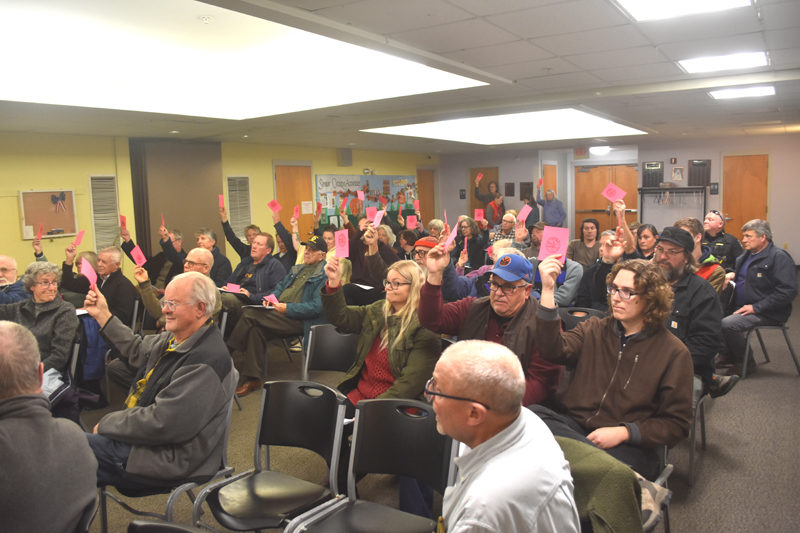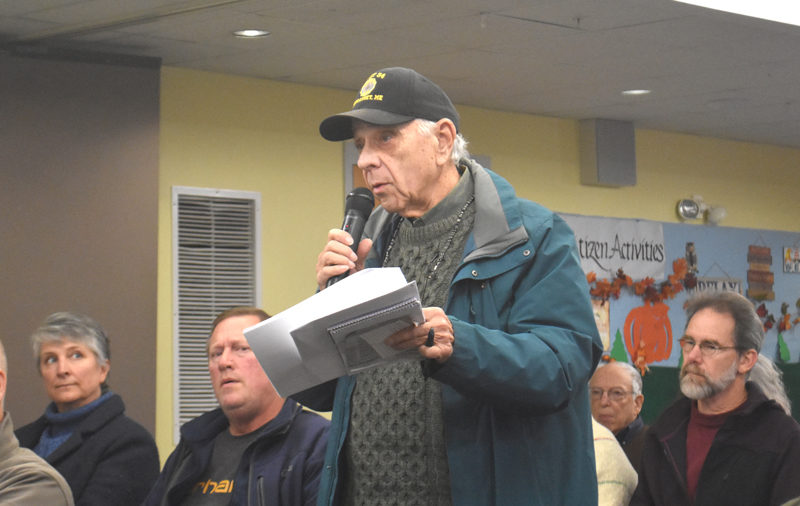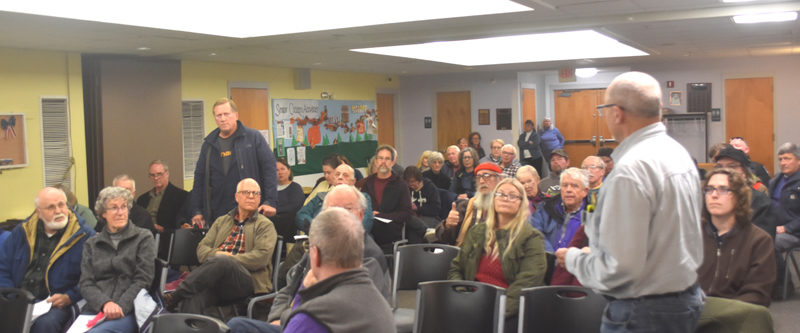
Wiscasset residents vote to allocate $353,750 from fund balance as a grant match toward phase one of the town’s wastewater treatment plant relocation project during a special town meeting on Tuesday, Dec. 3. (Molly Rains photo)
Wiscasset will allocate $353,750 from fund balance toward the relocation of the town’s wastewater treatment plant after voters approved the measure at a special town meeting Tuesday, Dec. 3.
The funding will be used to match a $4 million grant from the Maine Infrastructure Adaptation Fund. Together, these contributions, along with $5 million in congressionally directed spending that is already earmarked for Wiscasset, will fund the first phase of the water treatment plant relocation project, Wiscasset Town Manager Dennis Simmons said.
The first phase of the project, estimated to cost about $7 million, will include design, engineering, and construction initiation, according to Simmons.
In total, the entire project – which encompasses construction of a new wastewater treatment plant on Hodge Street at the location of the current town garage, and construction of a new garage and salt shed on Fowle Hill Road – is estimated to cost $51,150,000.
Superintendent of the Wiscasset Sewer Department Robert Lalli said moving the plant was imperative.
“There really isn’t a plan B,” he said. “The plant has to move.”
The current plant on Water Street is located on a floodplain, said Wiscasset Select Board Chair Sarah Whitfield, making it susceptible to a breach in the event of a flood, which would create a health hazard. As sea levels rise, so does the flood risk at the plant, according to a July 2022 assessment of the plant by Winterport engineering firm Olver Associates Inc.
The vulnerable location also means that the plant is not eligible for government funding for improvements, according to Lalli. Grants are available, however, for the more intensive and expensive project of moving the plant to a safer location, he said.
The entire project may take five to six years to complete, according to Simmons.
About 50 Wiscasset residents gathered in the community center for the special town meeting to consider allocation of the grant match, which was moderated by Susan Blagden. During discussion, resident Ed Polewarczyk said he was concerned about whether the future phases of the project would be tenable.

Wiscasset resident Ed Polewarczyk speaks during a special town meeting on Tuesday, Dec. 3, during which residents voted to authorize the allocation of $353,750 from fund balance toward the first phase of a wastewater treatment plant relocation project. Polewarczyk said he was concerned that funds may be difficult to acquire for future phases of the project, which Town Manager Dennis Simmons said may take upward of five years. (Molly Rains photo)
“My concern is that the town of Wiscasset is incrementally committing to a $50 million project that, when all is said and done, will probably be closer to $70 (million), and I don’t feel comfortable that there will be federal or state grants out there in the future to complete this thing,” Polewarczyk said.
“I get where you’re coming from, Ed. I’m concerned about future funding for this project going forward, but I’m not concerned about these two pots of money,” said Simmons, referencing the congressionally directed spending and $4 million grant.
With those funds available, the town should get started, because moving the plant was a priority, he said.
Resident Clifford Hendricks asked if the Environmental Protection Agency would provide funding for the move.
“They are going to give us as much as we would be eligible for. We are fighting for it,” said Lalli.
An alternative approach would involve fortifying the existing plant, Lalli said. The Olver Associates Inc. report estimated such improvements would cost between $25 and $35 million in 2022. However, according to Lalli and Whitfield, federal agencies like the EPA would not supply funding for such a project given the vulnerable location of the plant.
“They’re not going to give out grants and money for something that’s in a floodplain,” Whitfield said.
After less than 20 minutes of discussion, residents voted to move the question, ending debate. The motion carried after a hand-raise vote.
“I am thrilled that we have some people who really care about this town,” said Lalli after the meeting.
The Wiscasset Select Board authorized Simmons to accept the grant agreement during their regular meeting, which followed the special town meeting (see related article in this edition).
For more information, go to wiscasset.org or call 882-8200.

Wiscasset resident Clifford Hendricks speaks with Wiscasset Sewer Department Superintendent Robert Lalli during a special town meeting held Tuesday, Dec. 3, to discuss funding phase one of a wastewater treatment plant relocation project with $353,750 from fund balance. A preliminary estimate put the total cost of the multi-year, multi-phase project above $50 million. Grants will fund the majority of the $7 million first phase of the project, and the town hopes to acquire grants for future phases, said Wiscasset Select Board Chair Sarah Whitfield. (Molly Rains photo)



